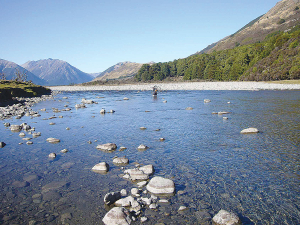OPINION: As decisions around freshwater rules edge closer, the message from dairy farmers is clear.
Farmers want - and DairyNZ is strongly advocating for - sensible rules that provide certainty; a focus on ecosystem and human health outcomes rather than just strict nutrient numbers; support for catchment groups and practical mitigations; and policy settings that enable both environmental progress and the future of our dairy sector.
Thank you to everyone who has joined our webinars, spoken with us at catchment meetings, or sent in your views. Your input is important as the first phase of the Government's freshwater consultation wraps up at the end of July and DairyNZ prepares its submission. Another opportunity will come later this year - likely October - when we see the first draft of the new rules.
What I'm hearing from those I talk with is that without a doubt, dairy remains a valued and valuable sector critical to New Zealand's future economic success - with more enabling policy a shared interest between DairyNZ and the Government.
The Government's proposals include updates to Te Mana o te Wai, simpler wetland rules, a review of nitrogen limits, and more flexible objectives. These changes could reduce red tape, but only if they result in rules that are practical and workable on farm. We support the consultation process and the goal of improving freshwater policy, but we are advoacting for change that reflects on-farm realities and builds confidence for the future.
We support a shift away from rigid numerical limits. Instead, we want to see greater focus on ecosystem and human health outcomes. We support better use of tools like certified and audited Freshwater Farm Plans. More enabling rules around constructed wetlands is another priority.
The dairy sector is investing heavily in science-backed solutions to reduce its environmental footprint, including nitrogen, phosphorus, and sediment losses. Proven practices like using plantain, catch crops, good farming practices and stacked mitigations through Low N Systems are already delivering results, such as the potential for nitrate reductions of up to 60%, with further gains possible with supportive policy. These efforts show the sector's strong commitment to improving freshwater quality while remaining economically viable.
DairyNZ has spent the past year preparing to provide a workable replacement to the existing policy. Our team has developed an alternative freshwater framework to support a constructive, science-led response. We are pushing for four key outcomes: Practical, science-based rules; clearer focus on environmental and human health; farmer-led, catchment-scale solutions that reward good practice; and a policy package trusted by farmers, communities and markets.
Beyond freshwater, we are involved in the wider RMA reform, where we have concerns. We've submitted on both recent Amendment Bills and the Fast-Track Approvals Bill, calling for enduring and enabling policy settings with pragmatic consenting pathways. We are also working with regional councils to ensure the pause on new freshwater plans is used to improve, not shelve, the evidence base for environmental limits.
We know that right now, many of you are doing your best to interpret complex rules while managing the day-to-day realities of farming. And with calving underway or around the corner, it's all hands on deck.
In the meantime, keep doing the basics well: record nitrogen use, keep stock out of waterways, and implement your Freshwater Farm Plan. Together, we can ensure the next generation of policy supports both a thriving dairy sector and a healthy environment. Thank you for everything you do.
Tracy Brown is chair of DairyNZ


















